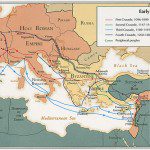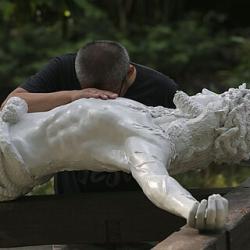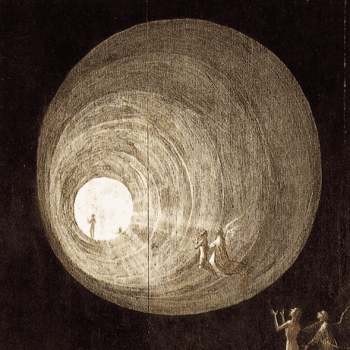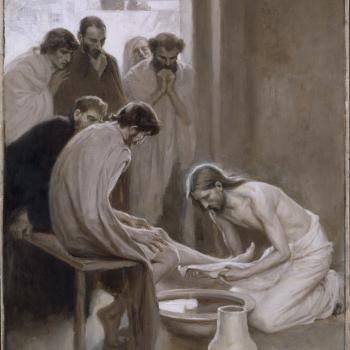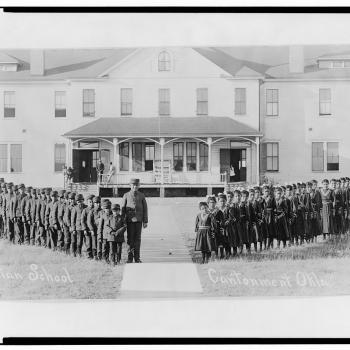
Jesus was led by the Spirit into the wilderness, to be tempted by Satan.
Why did Jesus, Who was God made human, need to go into the wilderness? For that matter why did He need to be baptized?
Lent is the time when we remember Jesus’ Wilderness Days. The period of Lent mirrors the time He spent in the wilderness, which was forty days. We are heading into Easter, which coincides with the Passover.
It’s all symbol, piled on top of metaphor. But it is not symbolic. And it is not metaphorical. It is as real as hunger and thirst. As hard as torture, blood and death. Our salvation was obtained at a great price.
Jesus made the first step toward the cross when He went to be baptized by John the Baptist in the Jordan river. This was the same John who first met Jesus when they were both unborn babies in their mothers’ wombs. It was the same John who leapt for joy at the presence of his Savior, even at that young age.
John’s birth was announced by the archangel Gabriel. He was a forerunner, the fulfillment of the prophecy that before the Messiah came, there would be a voice calling in the wilderness, to prepare the way for the Lord.
Jesus approached the Jordan river where John was baptizing. His purpose was to be baptized Himself.
At first, John, demurred.
I need to be baptized by you, he said.
But Jesus insisted with enigmatic words about fulfilling all righteousness.
When Jesus came up out of the baptismal waters, the spirit of God descended on Him in the form of a dove and the voice of God said this my beloved son. Again, it was symbolism, piled on symbolism but the reality was real. The water was wet. And the graces of baptism which are given to each of us are real.
Baptism, this fulfilling of all righteousness the Jesus referred to, opens the door we shut in the garden. It places us back in relationship with God.
Jesus followed His baptism by going into the wilderness. Why? Why did He, being wholly God, need to go into the wilderness at all?
Because He is our brother in every way. He was, as St Paul told us, tempted in every way. Just like us. Jesus is wholly God. But He is also wholly human.
He bleeds. He feels pain. He understands loneliness and anguish. He has a mother He loves with all his heart. He, at some point in His past, had faced the death of Joseph, His earthly father.
He is our brother, and as our brother, He had to experience what it was to be human, including the pain of temptation.
Temptation is not an easy thing. It is not a mosquito that we brush off, or buy the right spray and shield ourselves from. Temptation is the devil’s needle that he stabs us with over and over until it becomes a running sore.
Temptation is the chocolate cake left over from supper. Temptation is the beautiful man or woman at the office whose presence rivets us. Temptation is the money we could make, the success we could have, by, if we are a legislator, voting that one wrong way, or, if we are a cop, by looking the other way, or if we are a car salesman by telling the small lie, or if we are a doctor, prescribing that unnecessary procedure.
The list of temptations are endless. Most of them are minor things we can brush aside as if they really were that mosquito. But others get inside our souls and nag at us without mercy. These are the temptations whose temporary fulfillment fills some hole inside us.
The beautiful co-worker, the last piece of cake, the drive to have enough money to buy things and show off, all have one thing in common: They feed a hunger that goes deeper than the normal hungers which can be sated by a full meal, time with our spouse, and having enough to live a good life.
These temptations come from hungers that won’t be fed. They come from our unmeetable needs for solace, diversion, attention, and validation that go beyond legitimate needs and reach into the un-fillable holes in our souls.
Jesus was wholly human and wholly God. What that means is that He experienced our gnawing hungers for things we can not have. He understood our attempt to fill the un-fillable holes inside us with things, people, experiences.
He went into the wilderness to face the temptations we all face. It was, like the baptism that preceded it, a fulfillment of all righteousness. It was God made human, being fully and wholly human. He placed Himself before satan and let satan tempt and entice Him.
He did this when He was like we are when temptations work their worst on us: When he was alone, tired, hungry, thirsty and sore. He let satan lay out temptations when He was exactly where we are when we’re weakest: In the wilderness.
Lent is about the journey Jesus made from the Wilderness to the Cross. We spend forty days in Lent, just as He spent forty days in the Wilderness. It begins for us on Ash Wednesday when we have a cross put on our forehead made of ashes and are reminded that the ultimate end of our time in this life is the grave.
Lent is a time a reflection and prayer. But it is a faint copy of the real wilderness times of our lives. The wilderness is when your spouse leaves you and you are alone and bereft because half your life has been shorn from you. The wilderness is when you lose your job and cannot replace it and are sleeping in a house you can no longer afford. The wilderness is when the doctor says that there is nothing more he or she can do. The wilderness is when you are isolated by lies and gossip or when you must face the violence of our society alone and in the dark.
The wilderness is defeat; deep, grinding defeat that leaves you vulnerable to any form of solace you can imagine, including the ones that harm other people or that do harm to yourself. Temptation is the bottle of booze you gave up when you started going to AA. Temptation is the desire for revenge against those who have hurt you. Temptation is the pleasure we take in our enemies’ pain, the desire to one-up and out-do, no matter what the cost.
Jesus faced a bit of what I call The Alone in the wilderness. He would drink the full draught of that Alone later, in His passion.
But He did not go into the wilderness until after He had been baptized. That all righteousness may be fulfilled, He said to John the Baptist.
Lent is a forty day period that begins in water and ends in blood.
Baptism is the mark of God on our souls. It is our first entry into the family of those who are marked by the Blood of Lamb. We enter the doorway to salvation through baptism; first by water, then by blood.
Behold, the Lamb of God, John the Baptist said when Jesus approached the river. We are twice baptized. Our sins are washed away by the waters of baptism, and we are marked with the blood of the lamb of God on the doorway of souls. The message is there, for death to see: You may not enter here. It is the Lord’s passover.
This great spiritual truth goes with us every day, and everywhere. It goes with us into the wilderness time of our lives. It is there when we suffer unjust treatment, when we are abandoned, when we are helpless before unimaginable violence, when we become the object of vicious gossip, lose our jobs, fail that test, endure that illness, lose that limb, face that diagnosis. It is there with us in the wilderness time of our Alone.
When you are in your wilderness, remember your baptism. Remember the mark of the Blood of the Lamb on the lintels of your heart. Remember, always, that your salvation was purchased with a great price, that you are indeed worth more than the grass of the field and the birds of the air.
Remember that God loves you with an everlasting love and that He has already saved you from the temptations of your wilderness time. You are not alone. You are never alone.
Not even in the arid wilderness of The Alone.



